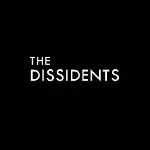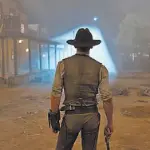Many people were impressed by the scene in Noah Baumbach's new film "Frances Ha" where the main character joyfully runs through the streets after moving into her new apartment in Chinatown. The background music "modern love" that represents her heartfelt confession is truly remarkable. This is one of my favourite scenes, and I immediately think of similar scenes from "Bad Blood" or "The 400 Blows."
However, I believe the more special scene is when Frances decides to invite Lev to dinner but her credit card doesn't work, so she runs to find an ATM to withdraw cash. On the way back, Frances falls down (and happens to be blocked by a car), but she gets up without pausing for even a second and continues running. These few seconds actually reflect her life at that time and the movie itself: temporary unemployment, no fixed residence, abandonment by friends, and loss of her boyfriend, but she must keep busy or else she won't be able to afford rent. It sounds miserable, right? But both the characters and dialogues in this movie are more like a form of "finding humor in adversity," just like the car blocking her path. She is not without pain, but the movie does not focus on that aspect.

I think "Frances Ha" and HBO's "Girls" are quite different. Both shows depict the struggles of twenty-somethings in New York, which inevitably leads to comparisons. "Girls" is more like someone taking off your band-aid and showing you the scars of life. Low-income young people in big cities will encounter various troubles with their parents/friends/lovers/work (or even appearance), and this show gathers all these frustrations into one person and vents them out, resonating deeply with the younger audience.
However, Noah Baumbach and Greta Gerwig gave Frances a relatively "happy" ending in the not very dramatic 84 minutes, just as they said in an interview, "We need to see such an ending." Frances and her friends turn the hardships of life into humorous self-mockery, "un-date-able", "this apartment knows itself too well". Frances is a girl who loves reading, she always uses books as examples, but in the movie, she is like that lighter in Paris that won't light up no matter how many times you try, stuck in this chaotic chapter. But even if a book can't be written anymore, it can always continue to be written. When you fall, there is always a way to get up - at least that's what Baumbach and Gerwig believe.
"Frances Ha" and "Girls" also differ in their portrayal of friendship. By season 2, the lives of the four girls in "Girls" become very fragmented, with no detailed depiction of their best friend life as seen in the first season. On the other hand, "Frances Ha," according to Greig, is "pure friendship." The film's Frances starts off by breaking up with her boyfriend, indicating that the theme is not about love. Sophie, described by Frances as "the other me with a different hair colour," is her "best friend." Although she moves out of the apartment they rent together early on, she remains an important character throughout the film. Apart from Frances' monologue after dinner at her friend's house in the middle of the movie, the entire film revolves around this kind of female bond. This realization is also a symbol of Frances' growth - the best, soulmate-like friends don't necessarily have to spend every day doing the same thing, but rather those who can share your gaze and emotions at a specific moment, even if it's just for a fleeting instant.

We can say that this film is a "chapters format" because it uses Frances' moving process to divide it into several stages: Brooklyn at the beginning, then Chinatown, Sacramento, Paris, etc. Therefore, the film doesn't have dramatic conflicts; it feels like pieces of a puzzle put together, making you feel like you're constantly running alongside Frances.
Many people compare this film to Woody Allen's New York stories, such as classics like "Manhattan" and "Annie Hall." In fact, if we really want to say it resembles Woody Allen, it would be more accurate to say that Noah Baumbach's debut feature-length film "Kicking and Screaming" looks more like him, especially the graduation party scene at the beginning which is reminiscent of a younger version of "Husband, Wife, and Lover." "Frances Ha" is more of an homage to the New Wave movement, not only because it intentionally uses vintage black and white photography, but also because compared to Greig's previous works, it has less intellectual and bookish entanglement and self-pity and more of a sense of freedom, passion, and even constant running and dancing impulses.

Greta Gerwig's involvement in "Frances Ha" extends beyond her exceptional performance; she also contributed as a scriptwriter. The film showcases seemingly natural dialogue and acting, which is no easy feat to achieve. Gerwig herself acknowledged the misconception that she merely improvised lines and received credit for it, stating, "People must think I just improvised lines in front of the camera and got my name in the credits." In reality, she invested significant effort from the start, meticulously crafting various film scenes, making numerous choices, and experimenting with different combinations to shape the final story we witness on screen. For instance, the argument between her character and Sophie in the bar bathroom required 42 takes to capture the desired essence.
Frances' line, "I feel like I'm at Walden Pond right now," is a testament to the movie's charm. If you remove the iPhones and Macs from the film, it could easily be a movie set in the 60s or 70s, or even the 80s. So Frances' story is not so much about this era as it is about human nature. We can confidently say, "I'm having a Frances Ha moment" many years from now because this movie will become, no, it already is, a "timeless classic."





















































Share your thoughts!
Be the first to start the conversation.